A run-down of the most impactful books I’ve read so far this year, and what I took away from them

Photo by Tom Hermans on Unsplash
At the beginning of the year, I hopped on the 12-week year wagon. That is, I began setting goals and measuring my activity based on 12-week intervals that I treat like a year. If you’re curious about how this works, check out the book. I highly recommend it.
Right now, I’m in the period where my “year” has ended. I’m reviewing, renewing, and setting the goals and plan for the coming 12-week year.
While doing that, I took a look at the books I read during that period that are worth sharing. Most of them, I’ve shared already in some way, shape, or form. But I figured it might be helpful to compile that list here, with a brief blurb about why I liked the book, and what I think it has to offer.
[note: the links to the books on Amazon are affiliate links, but I’ve chosen the books on their merit alone]
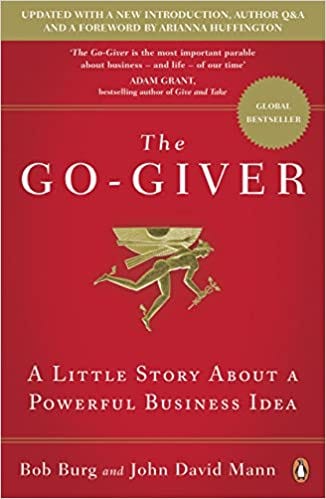
credit: Penguin
The Go-Giver: A Little Story About a Powerful Business Idea
by Bob Burg and John David Mann
What’s interesting about this book is that it’s at once both fiction and nonfiction. It unfolds as a narrative, like one you’d read in a fiction book. And by the authors’ own admission, it’s not a true story. However, the story is based on people the authors have known and worked with, and the principles it outlines in the story are ones that the authors stand by.
It’s a short, but powerful book that illustrates an underlying principle I’ve grown to appreciate as I spend more time in the business world: give more in value than you receive in payment. I first encountered it in another book I read (which is now among my absolute favorites) called The Science of Getting Rich. And since then, it’s continued to pop up here and there.
There are also some more subtle principles in the book that relate to this one. And the story effectively keeps the reader engaged, and explains the principles well via examples. I managed to read this book fairly quickly, over a single weekend, and the time flew by. It’s that quick of a read.
Whether you’re new to the world of business or community involvement, or just looking to up your game, you can benefit from reading this little book.
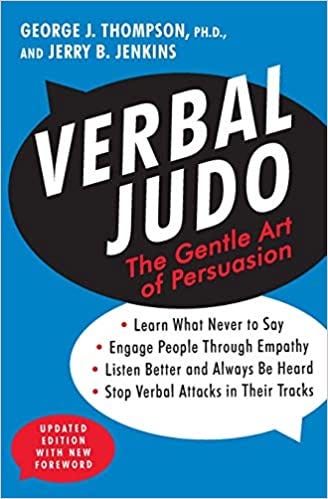
credit: William Morrow Paperbacks
Verbal Judo: The Gentle Art of Persuasion
by George J. Thompson
Given my love of writing, it’s only natural that I’d be into a book about the power of words. But Verbal Judo was even better than I thought it would be. The book is a veritable Swiss-army knife of how to communicate personally with people in a strategic and effective way. Despite the subtitle, it’s not about some deceptive method of tricking people. It’s more about listening well (i.e., with empathy), building rapport, and honoring the uniqueness and value of individual people. I wouldn’t even call the method it teaches strategic communication, but rather wise and ethical communication.
Thompson’s background is much more interesting than your average author of personal development books. He started as a Ph.D in English literature, then abruptly quit to pursue a career as a beat cop. This book — -or rather, method — -is the result of what he learned through his work as a police officer — -having to verbally spar with hundreds of difficult people each year. Thompson spent the rest of his life teaching the methods of communication & negotiation he developed to police forces and business people around the world.
I’m still processing everything I got from this book, but one of my favorites is this: When someone is getting angry (or already angry), but you don’t think they should be, say something like “I understand that” or “I appreciate that”. And then request that they do what you’re asking them to do. It’s easier said than done, but I’ve tried it, and it works to keep things from escalating in tough discussions.
Another tidbit I loved is this: it’s actually more effective to let people hurl insults or just generally fly off the handle at you — -so long as they’re doing what you want them to. If you just stay even keel and steadily move the discussion toward your intended result, it shouldn’t matter what people are saying, so long as you’re moving along toward your goal. We often miss this, and let our pride, and need for total agreement with us get in the way.
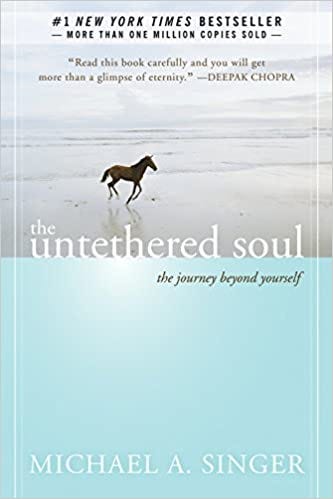
credit: New Harbinger Publications
The Untethered Soul: The Journey Beyond Yourself
by Michael A. Singer
This book is more on the spiritual side, but not so much so that it won’t also appeal to more practical readers. It’s a good exploration of many of the feelings that hold us back from being okay each day — -like stress, anxiety, frustration, and especially negative self-talk.
One of the most helpful takeaways from the book — -if not the main point of it — is that who you are is not who you normally think you are. By this I mean that all of the feelings and thoughts you have each day, buzzing around your head — -they’re not you. Your memories, emotions, tendencies, and character defects — -those things are just happening in your mind, but they’re not you. And that’s important to realize. Singer does a great job explaining this and diving into what that means for your daily life.
As Singer points out, once you realize that you’re not your feelings, thoughts, or emotions, you can actually settle into who you are — -and learn to be at peace. Again, it kind of sounds out there, but Singer’s explanation of how to back away from the buzzing thoughts and feelings of your mind is quite concrete and actionable. If mindfulness has ever sounded even somewhat appealing to you — -and frankly, even if it hasn’t — -this book is worth checking out.
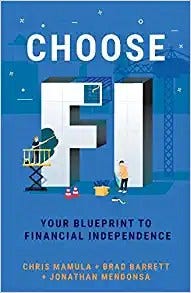
credit: Choose FI Media, Inc.
Choose FI: Your Blueprint to Financial Independence
by Chris Mamula, Brad Barrett, and Jonathan Mendonsa
Early this year, I got into the world of FI or FIRE — acronyms for “Financial Independence/Retire Early”. It’s a fairly enthusiastic community of people centered around a simple, but revolutionary idea: If you follow a fairly simple process, you can reach a point in life where work is optional for covering your expenses. Some call it retirement, others call it financial independence. Either way, it’s quite a goal.
The 3 authors of this book do a fantastic job laying out some basic principles which — -if followed — -can allow you to stop having to rely on yearly income from a job in order to support yourself. And if you’re serious enough about it, you can do it well before your 60s.
A very simple summary of their advice: save up about 27x your yearly living expenses and invest that into a total return index fund that yields dividends. You can then live off the increase to your principal and the dividends pretty much indefinitely. After that, it’s all about keeping your yearly income from your investments to a minimum, and avoiding paying taxes that you don’t need to.
The trick to getting there, of course, is to dramatically reduce your living expenses while saving aggressively for a period of time — -while you have a decent income from a job. Easier said than done, I know. But the book is filled with stories about people who did just that, and are now working because they want to, not because they need the money. It’s a place that I hope to be one day, and thanks to this book, I know how to get there.
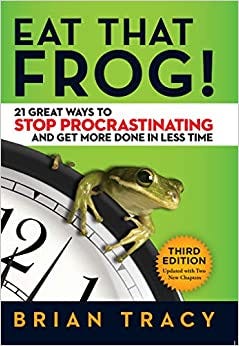
credit: Berrett-Koehler Publishers
Eat That Frog! 21 Great Ways to Stop Procrastinating and Get More Done in Less Time
by Brian Tracy
Tracy’s writing style is a perfect fit for his chosen subject matter. It’s a crisp, simple, to-the-point run-down of actionable strategies for getting more done.
My favorite practice of the 21 he offers up is the “A-B-C-D-E method”. It influenced my own productivity system, and is a great way to further embed prioritization into task lists that can often be more distracting than helpful. It goes like this:
Start with a list of everything you have to do in a given period (or at least today). Then place one of the following letters next to each item, based on where it fits on the scale.
- “A” are tasks you must do — -the titular frogs to eat. If you have more than one “A” task, rank them by writing A-1, A-2, A-3, and so on. Your A-1 task, then, is obviously the big, hairy important one.
- “B” are tasks you should do. Tracy calls these “tadpoles”.
- “C” are tasks that would be nice to do, but they’re not mission-critical.
- “D” are tasks you can delegate. If other people can do it, make it so! That frees you up to take care of A-C items.
- “E” are tasks you can cut. They’re either ones that are no longer relevant at all, or that you can wait until things change and they become worth your attention again.
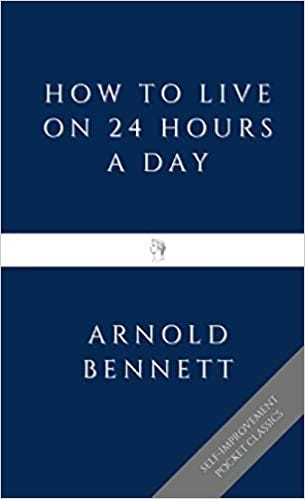
How to Live on Twenty-Four Hours a Day
by Arnold Bennett
Few books on time management can be classified as prosaic, but I would count this as one that can. Perhaps it’s because it was written in the first decade of the 20th century. Perhaps it’s because its author — Arnold Bennett — was a prolific fiction and drama writer.
Either way, this book was not only a joy to read, but also at once practical, philosophical, and elegant. It successfully marries concrete suggestions for better productivity with elegant musings about the meaning of life and the purpose of work.
I loved the book so much, I wrote an entire article about it — -largely because it seems like no one else was giving it its due. Although, to be fair, I did hear about it from none other than Brian Tracy (see the above book) — -who counts it among his absolute favorites.
There are so many useful ideas and re-frames in the book, but to pick one (perhaps to entice you to read the slim but rewarding book), I’ll choose “the 7 1/2 hour miracle”. Bennett suggests you devote 7 1/2 hours each week to your most important work — -whatever that might be. He suggests 3 90-minute sessions during the weekday evenings, and one 3-hour session during the weekend. His retort for those who claim they don’t have that time is priceless:
What I suggest is that at six o’clock [P.M.] you look facts in the face and admit that you are not tired (because you are not, you know), and that you arrange your evening so that it is not cut in the middle by a meal. By so doing you will have a clear expanse of at least three hours. I do not suggest that you should employ three hours every night of your life in using up your mental energy. But I do suggest that you might, for a commencement, employ an hour and a half every other evening in some important and consecutive cultivation of the mind. You will still be left with three evenings for friends, bridge, tennis, domestic scenes, odd reading, pipes, gardening, pottering, and prize competitions.
The guy had a gift, right?
There’s no doubt in my mind that much like Wallace Wattles’ The Science of Getting Rich ( which I also wrote an article about), I’ll be re-reading this one quite soon.
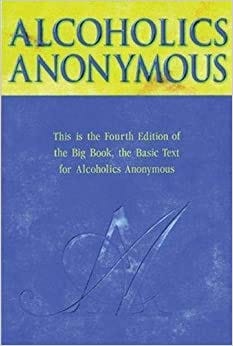
credit: AA World Services
The Alcoholics Anonymous Big Book
by AA World Services
Years ago, I ran with some folks in the Recovery Community. I had the privilege to attend some AA meetings in my life, and what those people do there is some of the most noble and difficult work out there. I didn’t quite know what self-help really looked like until I saw that.
THE guidebook of AA is called “The Big Book.” It contains an explanation of the very complicated and difficult phenomenon of addiction, as well as stories of the founders and early members. It’s had enough of an impact on me since I initially read it years ago that I still come back to it now and again — -as I did this very year.
The center of the book is the now-famous 12 steps that the organization uses as its principles for recovery from addiction. I won’t recount them all here, but the 12 steps have a wider application than just overcoming addiction. They’re principles that — -when sufficiently understood — -can help you improve and fortify your character and your life.
I’ve written about it elsewhere, but here’s a pull quote that explains just how I see these principles working for a wider audience:
Step 2: Believe that only something greater than yourself can help you become better than you are.
Steve Wozniak — co-founder of Apple, and legendary figure in computing — once summed up the motivating factor in his journey by saying:
“I didn’t do any of this for the money, I did it because I wanted to bring good computers to the world.”
If you are self-centered, self-serving, and self-involved, the odds of actually becoming a better person are pretty low. Rather, devoting yourself to service — serving someone or something bigger than just yourself — not only will the rewards be greater, but the motivation will be more persistent.
On my best days, I follow principles like this — -and I have a group of alcoholics from the 1930s to thank for it. Who’d have thought?
Q1 of 2021 was a quarter of good reading for me. I expect the same for Q2. I’m already starting off with some fun reading — -on the history of venture capital as well as bullet journaling. If this helped turn you on to some books worth reading, I’ll try to make it a point to do this again in July.